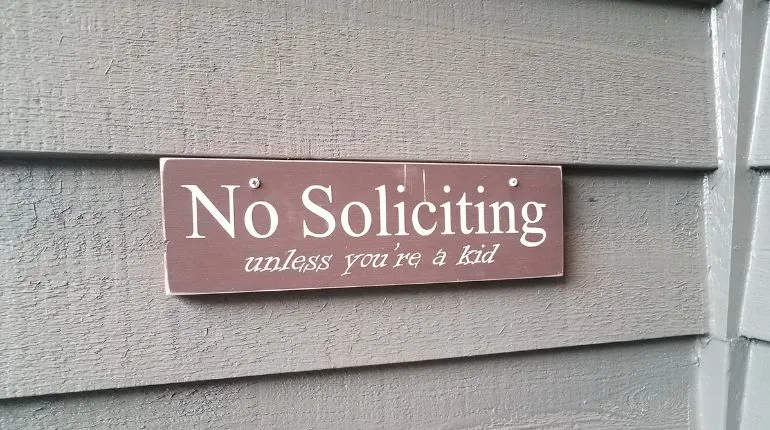The advent of the internet has changed how businesses and organizations reach people. However, door-to-door solicitation still occurs in many parts of North America. Homeowners, small business owners, and communities managed by homeowners associations continue to receive visits from salespeople, political canvassers, and religious representatives. To reduce unsolicited interaction, many property owners place no solicitingsignsto communicate a clear message and protect personal privacy.
The effectiveness of no soliciting signs depends on multiple factors. These include sign visibility, message clarity, and whether local laws support enforcement. In this guide, you will get to know if do not solicit signs work., how no soliciting signs function, how they influence solicitor behavior, and what property owners should consider when installing them.
No soliciting signs can deter uninvited visitors when clearly visible and supported by local laws, providing a legal basis for reporting violations.
Door-to-door solicitation is legal in many areas, but signs help property owners manage unwanted contact by reinforcing their right to deny entry.
To be effective, no soliciting signs should be placed in visible areas, use simple language, and feature clear design elements like contrasting colors for easy readability.
Do no soliciting signs really work?
Yes, no soliciting signs are effective in discouraging uninvited visitors from entering residential or business property.
When clearly displayed and supported by local trespassing laws or property policies, these signs can serve as a valid notice. If someone chooses to ignore the sign and proceeds to make contact, property owners may have legal grounds to file a complaint. Enforcement is stronger when the sign is clearly worded and placed in a visible location.
What does “No Soliciting” sign mean?
No soliciting means individuals are not allowed to approach the property to sell products, offer services, or ask for donations.
This message is often displayed by property owners who want to limit unexpected contact at their residence or place of business. It applies to a wide range of solicitors, including sales representatives, charity fundraisers, and survey collectors. Businesses may also use this type of sign to discourage walk-ins asking for promotions or sample items.
In many locations, ignoring a posted no soliciting notice may be considered a violation of privacy or property rights. Some areas include these signs within local trespassing laws, allowing owners to report violations when the instruction is not followed. While the sign does not guarantee full protection, it sets a clear expectation and can support further action when necessary.
Who are solicitors and what do they sell?
Solicitors are individuals who visit properties to initiate contact without an invitation. Their goal is usually to sell, promote, or request something from the resident or business owner.
They may engage in any of the following:
- Sell products such as household items, cleaning tools, or books
- Promote services including home repairs, pest control, or lawn care
- Distribute printed materials likeflyers, brochures, or political messages
- Request donations for charities or community projects
- Offer free samples or conduct surveys for promotional purposes
Some solicitors operate legally, while others may attempt to deceive or pressure property owners. A no soliciting sign can reduce these visits. However, legal exceptions may apply in some regions for religious groups or political campaigns, depending on local laws and free speech protections.
Is Door-to-Door soliciting legal?
Yes, door to door soliciting is legal in many places, but local laws may place restrictions on it.
Each state sets its own rules. Some states, such as Arkansas and Louisiana, have laws that do not allow solicitors to operate door to door. Others apply time restrictions or limit activity on specific days. For example, in Colorado, solicitors cannot visit homes between 9 PM and 8 AM. In Florida, soliciting is not allowed on Sundays.
Local governments may also require solicitors to carry permits or register with city offices. These rules help protect residents and regulate the way sales or donations are handled. A visible no soliciting sign may increase a property owner’s right to deny access and report violations.
If you are unsure about the laws in your location, contact your local city office or police department. They can provide accurate information based on your area’s regulations.
How can you prevent solicitors from approaching your property?
- Use visible signage:Place a clear message near entry points such as gates, doors, or windows. Signs that say no solicitation should be easy to read and positioned where they are most likely to be noticed.
- Add a legal notice for trespassing:A sign that warns against entry without permission can offer stronger legal support. This may help when a visitor ignores your initial request and continues to approach your door.
- Review your local rules:Some areas have specific laws about what signs must say to be valid. Check with your city or county office to confirm any requirements for wording, placement, or sign type.
Why should homeowners and businesses post visitor restriction notices?
- To control access to private spaces:Homeowners and business owners use visitor restriction notices to stop uninvited individuals from approaching the door or entry area. These messages are used to prevent sales pitches, donation requests, and distribution of materials without permission.
- To limit distractions and stay focused:Unexpected visits can disrupt the daily routine. Clear signage helps avoid interruptions during working hours, meetings, or personal time. This supports productivity in offices and comfort in homes.
- To create clear expectations for visitors:Property owners can choose the message that suits their space. Some signs send a firm instruction to avoid any form of solicitation. Others provide friendly guidelines, allowing visits from neighbors or known community members while setting boundaries for strangers.
How to ensure your ‘No Soliciting’ sign is effective?
Unwanted visits from solicitors can affect how smoothly a business or home operates. For workplaces, it may interrupt employee tasks or reduce the quality of service for customers.
In residential areas, it may disturb moments of rest, relaxation, or personal time. Posting a clear visitor restriction message can help reduce these interruptions and make sure your space remains focused and undisturbed.
- Place the message where it is easy to see:A sign is most effective when it is placed in a location where all visitors can see it before approaching the entry. Mount the notice at eye level near gates, doors, or pathways. This helps ensure that the message is seen and understood early.
- Use clear and simple wording:Keep the language short and easy to read. Most areas accept a basic phrase that states the intent to prevent uninvited contact. Avoid extra text that may reduce clarity. A direct message improves compliance.
- Choose design elements that stand out:Select colors and fonts that are easy to read from a distance. Signs with a white background and red or black text are often more visible.
Final thoughts
Using a clear and visible notice to discourage soliciting is a practical way to manage who approaches your property. It supports a quiet environment, reduces unnecessary interruptions, and communicates boundaries to visitors.
Whether placed at a home or business, the message serves as a direct reminder that unsolicited contact is not welcome. When supported by local regulations, it may also provide legal backing. A well-placed sign is a simple and effective way to protect time, space, and privacy.





